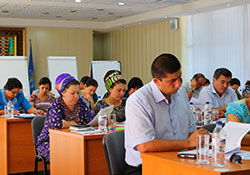Public health laboratory professionals in Turkmenistan trained in biosafety and biosecurity

WHO/Eugene Gavrilin
WHO/Europe organized the training to ensure that professionals could prevent the accidental or deliberate spread of diseases in their work. This was part of a project co-funded by the European Union (EU) to strengthen the safety and security of public health laboratories. Two courses were held in Ashgabat on 30 June–4 July 2014 at the request of the Ministry of Health and Medical Industry of Turkmenistan.
Shipping of infectious substances
The first course trained and certified shippers of infectious substances from laboratories in international transport regulations. It focused on the categorization of these substances, and requirements for their packaging, labelling, documentation and refrigeration.
After successful completion of the course, over 20 participants received WHO certification to transport infectious substances by air, in accordance with international standards for public health needs.
The training assists public health professionals working on the surveillance of communicable diseases (such as poliomyelitis, measles, rubella, tuberculosis and influenza) and particularly dangerous pathogens.
Biorisk management
The second course targeted professionals working in biorisk management, aiming to reduce the threat of infectious disease in laboratory environments. It gave over 30 participants the opportunity to use a robust methodology to identify and control the biosafety and biosecurity risks of bioscience laboratories. They learned about the latest advances in ensuring the safety and security of such laboratories and practical skills in assessing and mitigating biorisks, and monitoring performance.
Continuing WHO and EU project
The growing number of laboratories worldwide that contain dangerous pathogens increases the risk of accidental or deliberate spread of diseases with a major impact on public health and security. The EU is therefore funding a project for "strengthening health laboratories to minimize potential biological risks", which started in 2014. Its overall objective is to minimize biorisks by strengthening laboratory biosafety, biosecurity, quality management and diagnostic capacity.
The project supports the implementation of the International Health Regulations, an important framework for promoting biosecurity and biosafety. WHO/Europe has conducted similar courses for public health professionals from over 25 Member States in the WHO European Region.



